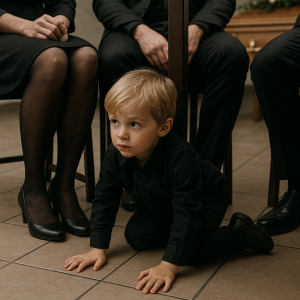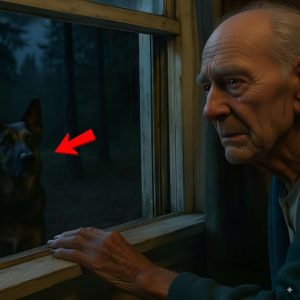I had only just secured the keys to my new cottage when the phone rang. It was my daughter-in-law.
“We’ll be there in two hours with twenty of my relatives. Get the rooms ready and prepare food—we’ll be staying two weeks.”
I smiled faintly… and began to form a plan.
The quiet inside that cottage wasn’t emptiness; it was presence. It carried the faint perfume of fresh paint mixed with aged wood, the smell of independence reclaimed. For six years, my world had been Kinley’s basement—her charity doled out with strings so heavy they felt like chains. My life had been reduced to folding laundry, packing lunches, and quietly orbiting their household. With Roger gone a decade now, I had slowly eroded into something less than myself, a background fixture.

But this cottage was my rebirth. Every coin pinched, every daydream of solitude, every refusal to give up had been poured into these walls. The deed bore only my name, and I kept it displayed on the counter—not just as legal proof, but as a banner of liberation.
I was smoothing linens into a drawer when the shrill ring of the phone cut through the stillness. I wiped my hands, already knowing who it was. Kinley’s voice, brisk and clipped, came through. “Just letting you know, we’re on our way. About two hours.”
“We?” I asked.
“Yes. Me, Camden, the kids, and about twenty from my side of the family. I told them you’ve got plenty of space now. You’ll need to get the guest rooms ready and cook for everyone. We’re staying two weeks.”
No congratulations. No courtesy. Just command, sharp as a slammed door. For a moment, the old me—the shadow in their basement—almost whimpered about still-unpacked boxes, about paint not yet dry.
But standing in my own home, breathing in its promise, something hardened inside me. I hadn’t clawed my way to freedom to be caged again.
“Of course, dear,” I said smoothly. “I’ll prepare everything.”
The trick with people who don’t ask your opinion is not to offer one. I ended the call, walked to the drawer, pulled out a legal pad, and drew two columns. One side read: Food, Bedding, Arrangements. The other: Documentation, Ordinances, Legal Recourse.
I underlined Documentation twice.
By noon the next day, vans and sedans were spilling into the drive, ejecting bodies onto my lawn in waves. I counted them: twenty-two. Not an error—just indifference. They bellowed greetings without approaching me, without hugs or congratulations. Within minutes, one cousin was rifling through my fridge, an uncle tested the recliner, and a child was shrieking about the lack of Wi-Fi.
Kinley marched in, cooler dripping on my counter. “Good, you’ve started. Camden’s brother’s gluten-free. Don’t forget.”
I nodded serenely. And every offense, every muddy footprint, every dent, I recorded.
Click. A photo of juice leaking onto the floor.
Click. A shot of children bouncing on freshly made beds.
Click. The snapped towel rack dangling from the wall.
By the third night, the house was chaos. Music throbbed until midnight, my knives vanished, and greasy plates were left outside to lure insects. They treated my home as communal property and me as its maid.
But while they slept, I worked. I compiled photos, typed notes, and placed quiet calls to the county office about occupancy limits. Then I spoke with Deputy Clem, the officer I’d met when closing on the property. I laid out the facts, calm and measured.
“Just say the word,” he told me.
On the fifth morning, I printed twenty-two copies of a “Short-Term Lodging Agreement.” It detailed house rules, liability, and a fair nightly fee. I placed the stack at the dining table, beside their clutter.
That night, after a modest roast chicken dinner, I cleared the plates and didn’t head for the sink. Instead, I stood, my voice slicing the noise like a blade.
“If I could have your attention.”
Silence. Kinley glared. “Mom, what’s this? We were about to watch a movie.”
“This,” I said, sliding the first copy to her, “is a lodging contract. Any guest staying beyond forty-eight hours must sign.”
Laughter, scoffs, outrage. “You’re charging your family?” Kinley snapped, cheeks flaming.
“I’m setting boundaries,” I replied evenly. “It covers costs and holds each of you accountable for damages.”
Her laugh was brittle. “We’re not signing.”
“That’s your choice,” I said. “But anyone refusing must leave by noon tomorrow.”
The room erupted with insults—selfish, ungrateful, crazy. I let the storm rage, my face calm. Then: a sharp knock on the door.
Every head turned. I opened it. There stood Deputy Clem, uniform crisp, tone neutral.
“Evening, ma’am. You called about an occupancy issue?”
Kinley paled. “You called the cops on your family?”
“No,” I corrected gently. “I called the County Enforcement Office about a code violation. He’s here to ensure a civil resolution.”
Deputy Clem scanned the crowded room. “Ma’am is within her rights. Either sign the agreements, or you’ll be trespassing and must vacate immediately.”
The silence that followed was sweeter than music.
They left in a fury, muttering curses. Camden lingered only to drop a note: I hope one day you see how cold this was. A final attempt at blame. I folded it away, unmoved.
I locked the door behind them. The echo of the bolt was not emptiness—it was sovereignty.
The house was wrecked, but I didn’t lift a finger. The cleaning service I had quietly booked arrived the next morning, humming as they restored order. While they worked, I wandered the garden, replanting lavender and cutting weeds, reclaiming each square of soil.
That afternoon, I phoned my lawyer. “I want to amend my will. The inheritance must depend on proven respect and kindness. Make it airtight.”
“Understood,” he said.
The welcome sign on my porch came down. In its place: a simple plaque—By Appointment Only. It wasn’t cruelty. It was clarity.
Days later, the quiet still startled me. But in the silence, I found strength. My garden thrived. A kind neighbor brought muffins and conversation that asked for nothing. Kinley’s messages came, vicious and manipulative, and I deleted them like the noise they were. Camden tried reason, but I saw the trap and refused.
Then, a letter from Randa—soft, apologetic, thankful for the hypoallergenic sheets. It was small, but it was real. Proof that even among the entitled, one voice could still carry decency.
I placed her note by Roger’s photo on the mantel. The cottage glowed with sunlight, dust motes drifting like sparks of promise. And I knew, with unshakable certainty, that I was not just free.
I was finally home.









